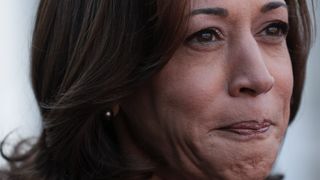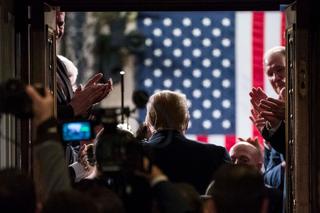On August 19, Kamala Harris told reporters, “I very much consider us the underdog. We have a lot of work to do to earn the vote of the American people.”
It might be unexpected to hear Harris describe herself as the “underdog” in the US presidential race. The Democratic nominee entered her party’s convention on a tidal wave of momentum. In just a few short weeks, she has erased Trump’s lead in the polls, broken fundraising records, and breathed life into an election that was flatlining barely a month ago.
But the vice president knows that this honeymoon period can’t last forever. And in many ways, the race to define Kamala Harris has not yet been won.
She enjoys the same polling advantage as a “generic Democratic candidate”. In other words, many voters simply don’t know who Harris is yet.
The latest Blueprint poll finds that just over half of Americans say their views of Harris are set in stone. Perhaps to both his detriment and benefit, the same can’t be said of Trump, who has dominated the media cycle for the better part of the past decade.
In the same survey, 71 per cent of voters say their minds are made up about Trump and that there is absolutely nothing that could sway their opinion about the Republican nominee. Just 7 per cent of voters are open to changing their minds about him – while almost three times as many say the same about Harris.
Harris is mounting the shortest presidential campaign in modern US electoral history. The unique circumstances of President Joe Biden’s late withdrawal mean she skipped the primary season and almost year-long public dissection that would typically mean that voters are more than familiar with a candidate’s life story and vision for the country by the time they’re officially crowned as the party nominee.
With fewer than 80 days to the election, she now has a very short window to show these voters what she stands for before their views solidify.
But this hasn’t always been her strength. Harris has long faced criticism that the American electorate can’t glean precisely what she stands for – an issue that has dogged her vice presidency and derailed her 2020 presidential campaign after she proved unable to articulate a distinct campaign vision or show voters where she landed on the party’s moderate/progressive divide.
Up to this point in the presidential race, Harris’ popularity has largely been carried by a sense of voter relief above all else. The Democratic nominee has steered clear of media appearances without the safety of a teleprompter and offered little concrete policies beyond the vague contours of an economic agenda she delivered last week.
Yet, Trump and his allies have so far also failed to clearly define Harris. Instead, they’ve taken a firehose approach of confused and at times contradictory attacks, attempting to simultaneously brandish her as a “radical left lunatic” with “dangerously liberal” ideas, an inconsistent “flip-flopper”, a “DEI (diversity, equity and inclusion) hire” nominated in an anti-democratic “coup”, a symbol of the Biden administration’s perceived failures as its so-called “border tzar”, and a plagiarist imitating Trump’s policy platform.
This lack of a coherent strategy has bought Harris valuable time.
Against this backdrop, the Democratic National Convention comes at a critical moment.
When she takes to the stage in Chicago, Harris will need to turn the collective Democratic sigh of relief about Biden’s withdrawal into a roar of approval for a positive agenda and clear picture of what Kamala Harris stands for.
After four days of a star-studded cast of former presidents and party leaders rousing the party base, Harris’ speech is her opportunity to reintroduce herself to the American public.
She can take control of the personal narrative of her life and journey up to this point, teasing out a golden thread of core beliefs and values that are now driving her campaign.
She can draw on her legislative achievements as vice-president – which Biden laid out in his “passing the torch” speech – to not tether herself to the past four years, but springboard her into a forward-looking, optimistic vision, fleshed out by a nod to her campaign’s policies surrounding reproductive freedom, voting rights and economic relief.
And, of course, she can preview her prosecutorial skills and willingness to take on Trump at the upcoming presidential debate, emphasising the Democrat’s message that he threatens American democracy and values – as has already been a key feature of the convention and her campaign so far.
The past few weeks were Harris’ chance to capitalise on her position as a fresh face after a tired redux, and recover core constituencies, such as non-white voters and young voters, that the Democrats were struggling to hold onto under Biden.
However, the success of the next phase of her campaign rests on whether Harris can make sure that these positive first impressions harden into something deeper.
On Friday, in the biggest speech of her career, Kamala Harris will step into the spotlight for what could become a turning point in her campaign. With less than three months until voters head to the polls, millions of Americans will be watching to see how she defines herself – or if it is Trump who will ultimately have the opportunity to do it for her.








